UNIVERSITY OF WISCONSIN River Falls
Newsroom
Students to present projects at Research in the Rotunda March 9
March 3, 2022 -- Research on rats’ empathy, alternatives to summer forage and exploring environmentally friendly ways to create chemical reactions are some of the research seven University of Wisconsin-River Falls students will present on Wednesday, March 9, at the State Capitol Rotunda in Madison for the 18th annual Research in the Rotunda.
“We are absolutely delighted to welcome back the University of Wisconsin System Research in the Rotunda after a year off due to the pandemic,” said UW System President Tommy Thompson. “This signature event is a celebration of our student’s undergraduate research and their innovative thinking to help find solutions to problems here in Wisconsin and beyond.”
Undergraduate researchers from across the UW System, along with their faculty advisers, will share their research findings on a variety of topics with legislators, state leaders, UW alumni and other supporters. Research in the Rotunda is scheduled from 10:30 a.m. to 2:30 p.m. Thompson is scheduled to give brief remarks at noon.
Social behavior in rats
Sid Peck and Dan Roever, UWRF seniors dual majoring in psychology and neuroscience, will present their research “A Friend in Need, Investigation Empathy and Prosocial Behavior Utilizing Rat Models.”
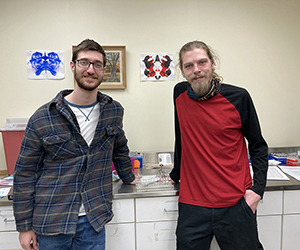 Part of the research was to replicate other research that found that in most cases a rat will help free another rat they cohabitate with trapped in an adjacent tube, particularly if there is a treat incentive. When a light source is added, the nocturnal rodents sense danger and the rate of freeing the other rat drops.
Part of the research was to replicate other research that found that in most cases a rat will help free another rat they cohabitate with trapped in an adjacent tube, particularly if there is a treat incentive. When a light source is added, the nocturnal rodents sense danger and the rate of freeing the other rat drops.
“We already know rats are social creatures,” Roever said. “We’re investigating how far that goes.”
“We’re slowly making the environment more threatening to them by adding light and making the arena bigger,” said Peck, of New Richmond.
The two plan to study the area of the rats’ brains to determine which are associated with empathy.
Both enjoy the undergraduate research opportunities available at UWRF.
“It helps bring the material to life and reinforce what I’m learning,” Roever, of River Falls, said.
Doing undergraduate research gave Peck a unique opportunity to be more involved at the university.
“We have some of the coolest professors here,” he said. “Asking questions is encouraged. Experiential learning is encouraged.”
Greener chemistry
Max Lewis, a junior majoring in biochemistry, will present his research on “Investigating Mechanochemical Means to Greener Transfer Hydrogenation.”
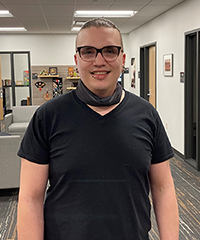 In his research, Lewis, of St. Paul, studied creating a chemical reaction induced by mechanical energy versus using solvents, which are toxic and difficult to dispose of. Different types of metal balls were added to water and substrate and shaken for up to 16 hours as the mechanical agent. Initial research showed nickel-manganese alloy worked the best.
In his research, Lewis, of St. Paul, studied creating a chemical reaction induced by mechanical energy versus using solvents, which are toxic and difficult to dispose of. Different types of metal balls were added to water and substrate and shaken for up to 16 hours as the mechanical agent. Initial research showed nickel-manganese alloy worked the best.
“We would have to determine if it can be scaled up and if it would work on a larger economy of scale,” Lewis said.
Lewis is looking forward to Research in the Rotunda.
“I thought it would be a great opportunity to share my research and to get to know some of the other research students from other UWs,” Lewis said. “I also thought it would be a good experience to explain research to people who aren’t scientists and share why research is important.”
Alfalfa alternative
Jack Morrison, a junior crop and soil science major, will present his research on “Summer Annual Options for Wisconsin.”
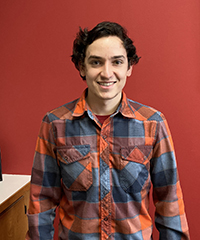 The research was designed to find an alternative to alfalfa forage in case of winter kill. In his research, Morrison, of Farmington, Minn., found Sudan grass and millet showed the highest level of crude protein and digestibility of five summer annuals he looked at. Crude protein was 15%. Alfalfa has 19% protein.
The research was designed to find an alternative to alfalfa forage in case of winter kill. In his research, Morrison, of Farmington, Minn., found Sudan grass and millet showed the highest level of crude protein and digestibility of five summer annuals he looked at. Crude protein was 15%. Alfalfa has 19% protein.
“Climate change is real,” Morrison said. “Farmers are going to have to make changes and roll with the punches winter cold can kill off alfalfa, and hot summers can cause more drought.”
Morrison said he chose UWRF because the smaller classes allow him to get to know his classmates and professors.
He is excited to take part in Research in Rotunda.
“I want to promote the undergraduate research at UW-River Falls because I think it is important,” Morrison said. “It gives me the option to do research as an undergraduate and that is a cool part of UWRF. I want to make sure the legislators know we’re out here.”
Geomagnetic effects on particle propagation
Physics majors Gretchen Hibbert, of Green Bay, and James Bowers, of Richfield, Minn., will present their research on “Geomagnetic Effects on Particle Propagation at the South Pole.”
The two took part in a paid internship last summer through National Science Foundation grant funds to conduct the research.
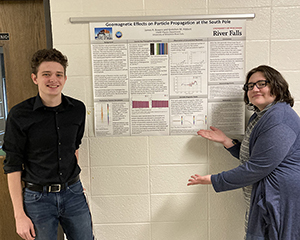 Using a simulated model of the South Pole, the students set out to determine if the geomagnetic field of the earth impacts the cosmic ray particles measured at earth's surface by Neutron Monitors. The results they gathered were inconclusive, largely they believe because of equipment limitations for the simulation.
Using a simulated model of the South Pole, the students set out to determine if the geomagnetic field of the earth impacts the cosmic ray particles measured at earth's surface by Neutron Monitors. The results they gathered were inconclusive, largely they believe because of equipment limitations for the simulation.
“We have set a baseline for future work,” Bowers, a junior, said, noting that other researchers will have the opportunity to build on their work.
They both are looking forward to sharing their research with legislators.
“It is an amazing opportunity just to be able to go and present,” Hibbert, a senior, said.
Gender inclusivity
Senior Aspen Larsen, a social work major from Wauwatosa, is presenting research on “The Impact of Gender Inclusivity on the Education of Student in College and Universities.”
Larsen started the research as part of a Research Methods class.
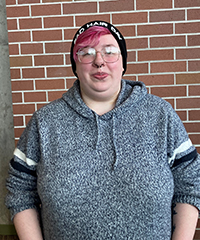 “Gender inclusivity is something I am fairly passionate about being part of the queer community myself,” Larsen said.
“Gender inclusivity is something I am fairly passionate about being part of the queer community myself,” Larsen said.
Larsen worked on student opinions of gender inclusivity and is also working on faculty opinions for Larsen’s senior thesis.
Larsen’s research indicates most students are comfortable with sharing their preferred pronouns particularly in classroom settings where professors ask everyone.
“Even a large majority of cisgendered students agreed they were not uncomfortable being asked their pronouns,” Larsen said. “I was fairly surprised overall the response was mostly positive in support of gender inclusivity. When everyone is sharing their pronouns, it doesn’t single out people. It creates a safer environment.”
Larsen is excited to present the research at the State Capitol and sharing the information to make a difference for other students.











